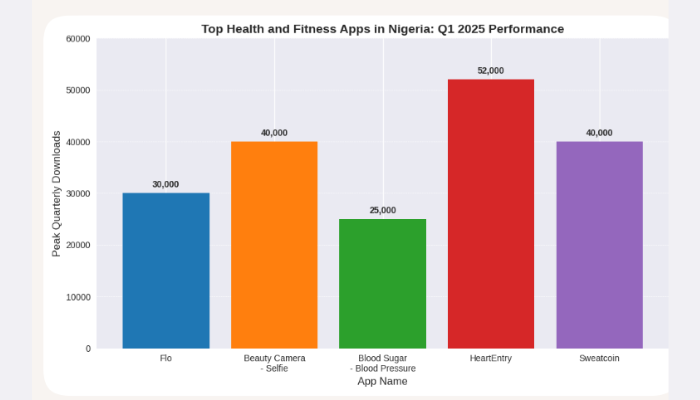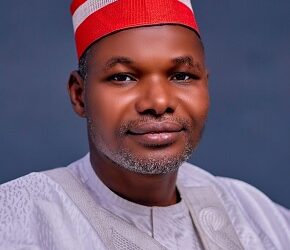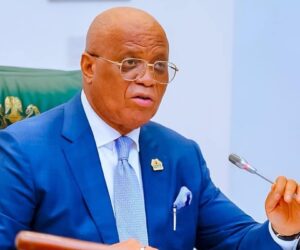Across Lagos and other major cities, the ‘fitfam’ culture has gained enormous ground. Jogging groups, cycling teams, and weekend exercise classes are now common in parks and open areas. This indicates a growing emphasis on preventing health issues, enhancing mental well-being, and fostering a sense of community. Additionally, there is a growing trend of wellness apps among fitness enthusiasts.
This momentum is reflected in the increasing scale of organised fitness events. The recent Lagos Women’s Run has become a flagship celebration of female athleticism, drawing over 10,000 participants. The first edition of Tour de Nigeria marked a new chapter, bringing together cyclists from different parts of the country and spotlighting Nigeria’s potential as a hub for fitness tourism. The Tour de Nigeria debut drew attention from sponsors and local businesses, eager to tap into the growing market of health-conscious consumers.
Earlier this year, the Access Bank Lagos City Marathon confirmed its position as a world-class event that also benefits the local community. By drawing crowds, sponsors, and headlines, it reminded Nigeria and the world that a well-run race can do more than test stamina; it can power cities, inspire brands, and fuel economic momentum.
Read also: Beyond fitness, here are health benefits of exercise
Fitness spending, market impact
Increasingly, workout routines are becoming a regular part of everyday life, changing how people spend their time and energy. More individuals are jogging solo at dawn or after work, making time for a wellness routine. Others gather in parks for group aerobics, while some take to skating rinks, dance studios, or even rooftop yoga sessions. Boxing is also gaining ground as a serious fitness choice, offering high-intensity workouts that blend cardio with discipline. The variety of fitness options is growing, and so is the number of people embracing them.
Gyms and boutique fitness studios are rapidly gaining prominence, with membership costs reflecting the rising demand. In Lagos, for instance, a monthly subscription at i-Ffitness Gym and Wellness Center costs N38,985, with a one-time new member fee of N57,881. Although the cost is high, many career professionals are willing to pay for structured programmes, modern equipment, and access to wellness communities. Virtual coaching platforms are also gaining traction among younger, tech-savvy users who prefer flexible routines.

According to DMI analysis, Nigeria’s gym membership market is steadily growing, with projections indicating a rise from less than N50 million in 2021 to N237.26 million by 2033. The year 2024 shows a notable increase, reaching N85.03 million, which suggests rising interest in organised fitness services. This growth reflects increasing health consciousness, city expansion, and a shift toward lifestyle-focused wellness. The consistent annual growth points to expanding opportunities for investors, gym operators, and wellness brands. As infrastructure advances and digital fitness platforms get more popular, the market is set to become a key part of Nigeria’s broader health and economic development plans.
Fitness events are also playing a key role in stimulating the economy, filling hotels, boosting restaurant sales, and creating temporary jobs in logistics and security. A hospitality manager in Lagos noted, “During major races, our rooms are fully booked days in advance. It is one of our busiest weekends of the year.”
In Lagos and Abuja, residents are investing more in activewear and supplements, often sourced from international brands. Sports vendors are reporting an increased demand for protein powders, resistance bands, and fitness apparel. A fitness coach noted that membership has doubled in the past two years, with clients seeking structured programmes and personalised coaching.
Read also: Fitness coach urges promotion of sector to enhance community health
Stronger bodies and a stronger economy
The country is starting to see real health and economic payoffs as people wake up to the dangers of sedentary lifestyles and conditions such as obesity, high blood pressure, heart disease, and diabetes. According to the World Health Organization (WHO), regular physical activity is tied to modest gains in life expectancy and lower rates of these diseases. Those improvements ripple into the workplace where fitter employees take fewer sick days, extend their working lives, and reduce medical bills for families and employers.
Experts say scaling community programmes and workplace wellness could deepen these effects. Amina Yusuf, a public health consultant and fitness advocate, told The Gaze, “Fitness is one of the most effective tools we have to fight non-communicable diseases in Nigeria. When people commit to regular activity, we see better blood pressure, heart health, and mental well-being. It is not just about looking good, it is about living longer and living better.”

Life expectancy in Nigeria rose from about 52.0 years in 2015 to roughly 54.6 years in 2024 while the gross domestic product (GDP) per person employed fell from about $13,800 to a low near $11,600 in 2020 before recovering to around $12,000 by 2024. The modest health gains amid economic volatility point to improving public health alongside shaky productivity. Growing participation in gyms, events, and wellness programmes could help sustain life expectancy improvements, lower chronic disease burdens, and support a healthier, more productive workforce
Fit for progress
The growing interest in exercise and wellness is reshaping lifestyles nationwide, despite affordability and limited infrastructure remaining obstacles. According to 6Wresearch, the fitness services market is expected to expand significantly in the coming years, supported by rising awareness of lifestyle-related illnesses such as obesity, hypertension, and diabetes. This shift is not only about healthier living but also about economic productivity. Employers are beginning to see the benefits of staff who take fewer sick days, extend their working years, and reduce medical costs. Opportunities are emerging in wellness tourism, corporate wellness packages, and tech-enabled fitness solutions that reach beyond city centres. With the right mix of policy support and private investment, the fitness industry could evolve into a powerful driver of improved public health and stronger national growth.









